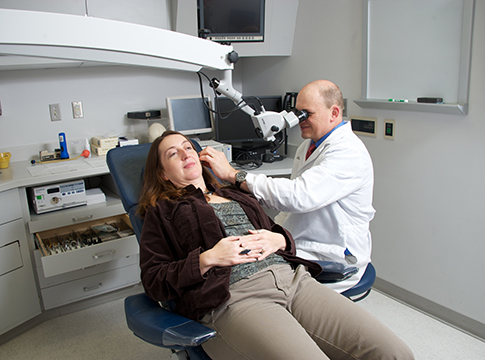Checking out the Area of Otolaryngology: What to Expect When You Consult an ENT
Otolaryngology, typically referred to as ENT, includes the medical diagnosis and treatment of nose, throat, and ear conditions. For those experiencing associated concerns, speaking with an ENT specialist can give clearness and relief. Understanding what to expect during such examinations is important for efficient interaction and care. This review will outline essential aspects of the ENT experience, including usual reasons for check outs and the procedures associated with medical diagnosis and treatment.

Understanding Otolaryngology: A Review
Otolaryngology, usually referred to as ENT (Throat, ear, and nose) medicine, is a specific branch of medication that concentrates on the diagnosis and treatment of problems influencing these vital locations of the body. This field encompasses a variety of problems, including those pertaining to hearing, equilibrium, respiratory system feature, and speech. Otolaryngologists are trained to take care of both medical and surgical treatments, utilizing sophisticated strategies and modern technologies. Their know-how prolongs beyond conventional conditions, dealing with concerns such as allergic reactions, sinus infections, and hearing loss. Additionally, they play a vital function in the monitoring of head and neck cancers cells, providing thorough treatment customized to individual person demands. Generally, otolaryngology remains essential for preserving wellness and lifestyle in affected people.
Common Reasons to See an ENT Specialist
Lots of people seek the experience of an ENT expert for a range of reasons, reflecting the varied nature of conditions that impact the ear, throat, and nose. Typical problems include persistent sinusitis, which frequently brings about consistent nasal congestion and facial discomfort. Allergies and their associated signs, such as sneezing and itching, likewise trigger visits to these experts (Voice). Hearing loss, whether progressive or abrupt, is an additional significant reason for assessment. Additionally, people might seek evaluation for throat conditions, including consistent hoarseness or ingesting difficulties. Rest apnea, defined by disturbed breathing throughout rest, is frequently resolved by ENT experts. Each of these conditions highlights the importance of specialized treatment in managing complex ENT-related health issues
Planning for Your ENT Visit
When preparing for an ENT visit, it is important to collect relevant info and take into consideration any type of particular concerns. Clients need to assemble a detailed clinical background, consisting of previous ear, nose, or throat concerns, surgical treatments, and current drugs. Documenting signs and symptoms-- such as regularity, duration, and intensity-- can offer useful understandings for the ENT expert. Additionally, individuals should prepare a list of concerns they want to ask, making certain that all concerns are attended to during the go to. Bringing along any type of pertinent clinical records or examination results can further assist the ENT in recognizing the client's problem. Finally, people should confirm their appointment information, consisting of time, date, and location, to reduce any last-minute complication. Proper preparation can improve the efficiency of the consultation and bring about better outcomes.
What to Expect Throughout the Examination
As the appointment starts, the person can expect to involve in a complete discussion with the ENT professional regarding their signs and case history. The professional will make inquiries regarding the duration, frequency, and seriousness of symptoms such as hearing loss, nasal blockage, or sore throat. Additionally, the individual's previous medical conditions, medications, and any type of relevant family background will be reviewed, helping the specialist in forming a full understanding of the client's wellness. The ENT may likewise inquire about way of life aspects, such as exposure to allergens or toxic irritants. This open discussion establishes a structure for the assessment, ensuring that the individual's worries are dealt with and establishing the stage for any needed assessments or referrals for treatment.
Analysis Tests and Procedures in Otolaryngology
A range of diagnostic examinations and treatments are important in otolaryngology to accurately examine and identify problems affecting the throat, ear, and nose. Typical examinations consist of audiometry, which gauges hearing function, and tympanometry, evaluating center ear pressure. Nasal endoscopy enables visualization of the nasal passages and sinuses, while laryngoscopy takes a look at the throat and singing cables. Imaging check here techniques, such as CT scans and MRIs, provide detailed views of head and neck structures. Allergic reaction screening may likewise be performed to identify triggers for sinus or breathing problems. These diagnostic tools make it possible for ENT specialists to develop an extensive understanding of individuals' conditions, making certain customized and efficient administration plans. Appropriate medical diagnosis is important for successful treatment end results in otolaryngology.
Therapy Alternatives Supplied by ENT Specialists
ENT specialists offer a range of treatment alternatives customized to deal with particular conditions impacting the ear, nose, and throat. These therapies vary from conservative strategies, such as medicine and way of life alterations, to even more intrusive treatments. Allergies might be handled with antihistamines or immunotherapy, while chronic sinusitis could require nasal corticosteroids or sinus surgical treatment. For hearing loss, ENT professionals usually recommend listening device or surgical interventions like cochlear implants. In instances of throat problems, alternatives can consist of speech treatment or surgical procedures to eliminate obstructions. In addition, they may offer guidance for handling rest apnea, including the usage of CPAP gadgets or medical treatments. Generally, the goal is to improve clients' lifestyle through personalized treatment and effective therapy approaches.
When to Seek Follow-Up Treatment With an ENT
Identifying when to seek follow-up care with an ENT professional is important for taking care of continuous signs and symptoms or problems connected to throat, nose, and ear conditions. People need to consider arranging a follow-up visit if signs continue in spite of preliminary therapy, such as chronic ear discomfort, nasal congestion, or throat discomfort. Adjustments in hearing, equilibrium concerns, or unusual nasal discharge might likewise call for additional evaluation. In addition, if a person experiences adverse effects from prescribed medications or has actually gone through a surgery, follow-up care is important to keep an eye on healing and address any worries. Timely assessments can ensure reliable administration of conditions, avoid possible problems, and provide assurance regarding one's wellness. Seeking follow-up care advertises proactive health management in otolaryngology.
Frequently Asked Concerns

What Qualifications Should I Try to find in an ENT Expert?
When seeking an ENT expert, one should look for board accreditation, appropriate experience, and strong person evaluations. In addition, reliable communication abilities and a caring technique can greatly improve the overall treatment experience.
How Do I Pick the Right ENT for My Requirements?
Choosing the ideal ENT specialist includes reviewing their qualifications, experience, and person reviews (Otolaryngologist). It is necessary to consider their interaction style and technique to treatment, ensuring they align with the person's certain health needs and choices
Are There Any Dangers Connected With ENT Procedures?
The dangers related to ENT procedures might include infection, blood loss, anesthesia complications, and possible damages to surrounding structures. Patients must go over these risks with their physician to recognize specific worries and warranty informed decisions.
Exactly How Can I Take Care Of Anxiety Before My ENT Visit?
To take care of anxiety prior to an appointment, individuals can practice deep breathing exercises, visualize favorable end results, prepare questions beforehand, and seek assistance from friends or family members, cultivating a sense of reassurance and peace.
What Should I Do if I Experience Negative Effects From Therapy?
If negative effects from treatment happen, the individual must immediately report them to their doctor. Adjustments to therapy or additional treatments may be needed to guarantee safety and security and efficiency in managing their problem - Sinus. As the assessment starts, the client can anticipate to engage in a complete discussion with the ENT specialist concerning their symptoms and clinical history. These analysis devices enable ENT professionals to create a comprehensive understanding of patients' conditions, making certain customized and effective management strategies. ENT experts offer a variety of treatment alternatives customized to attend to certain conditions impacting the nose, throat, and ear. When looking for an ENT professional, one should look for board qualification, relevant experience, and strong individual evaluations. Picking the right ENT expert includes evaluating their qualifications, experience, and person reviews
Comments on “How to Know It's Time to See a Voice ENT”